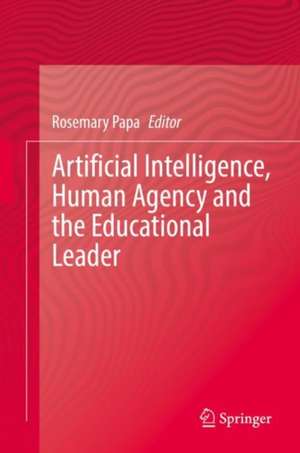Artificial Intelligence, Human Agency and the Educational Leader
Editat de Rosemary Papa, Karen Moran Jacksonen Limba Engleză Hardback – 7 dec 2021
| Toate formatele și edițiile | Preț | Express |
|---|---|---|
| Paperback (1) | 886.89 lei 6-8 săpt. | |
| Springer International Publishing – 8 dec 2022 | 886.89 lei 6-8 săpt. | |
| Hardback (1) | 892.35 lei 3-5 săpt. | |
| Springer International Publishing – 7 dec 2021 | 892.35 lei 3-5 săpt. |
Preț: 892.35 lei
Preț vechi: 1088.23 lei
-18% Nou
Puncte Express: 1339
Preț estimativ în valută:
170.77€ • 174.89$ • 142.05£
170.77€ • 174.89$ • 142.05£
Carte disponibilă
Livrare economică 25 februarie-11 martie
Preluare comenzi: 021 569.72.76
Specificații
ISBN-13: 9783030776091
ISBN-10: 3030776093
Pagini: 190
Ilustrații: XIII, 190 p. 14 illus., 5 illus. in color.
Dimensiuni: 155 x 235 mm
Greutate: 0.48 kg
Ediția:1st ed. 2021
Editura: Springer International Publishing
Colecția Springer
Locul publicării:Cham, Switzerland
ISBN-10: 3030776093
Pagini: 190
Ilustrații: XIII, 190 p. 14 illus., 5 illus. in color.
Dimensiuni: 155 x 235 mm
Greutate: 0.48 kg
Ediția:1st ed. 2021
Editura: Springer International Publishing
Colecția Springer
Locul publicării:Cham, Switzerland
Cuprins
Chapter 1. AI Transforms 20th Century Learning.- Chapter 2. Artificial Intelligence and Computer Design.- Chapter 3. AI Disquiets .- Chapter 4. Classrooms in 2051.- Chapter 5. Education in 2051.
Notă biografică
Dr. Rosemary Papa is the Founder of Educational Leaders Without Borders and she previously served as The Del and Jewel Lewis Endowed Chair in Educational Leadership and emeritus Professor of Educational Leadership at Northern Arizona University from 2007-2018. In 2015, she was the recipient of the AERA 2015 Willystine Goodsell Award, Women in Education SIG and gave the keynote address at AERA 2016, Washington, D.C. for her research on women and girls. In 2012, she was the recipient of the Arizona School Administrators Outstanding Higher Education Administrator of the Year Award. Dr. Papa has published 25+ books in the areas of leadership, educational policy, social justice, sustainability, school effectiveness, and technology for school leaders and teachers and faculty in higher education. Additionally, she has 3 major works in progress: Editor-in-Chief, Oxford Encyclopedia of Educational Administration (2021); Editor-in-Chief, Springer Handbook on Promoting Social Justice in Education (2020); and School Violence in International Contexts – Perspectives from Educational Leaders Without Borders (2019). As well, Dr. Papa has published more than eighty articles in refereed academic journals. She has served as a K-12 principal, chief school administrator, and worked in the California State University System office in a variety of intersegmental roles with the University of California.
Dr. Karen Moran Jackson is an Assistant Professor of Educational Psychology and Assessment at Soka University of America. She came to Soka University after working as a postdoctoral fellow and research associate at the Institute for Urban Policy Research and Analysis at the University of Texas at Austin, specializing in quantitative analysis and research methods. Dr. Jackson graduated from the University of Texas at Austin with a PhD from the department of educational psychology and a portfolio in applied statistical modeling from the department of statistics and data science. She has published in several academic, peer-reviewed journals and presented at conferences. Her research interests include adolescent development, mixed methods, and the use of data in educational settings. Prior to graduate school, she worked as a middle school science teacher in California and Texas.
Dr. Karen Moran Jackson is an Assistant Professor of Educational Psychology and Assessment at Soka University of America. She came to Soka University after working as a postdoctoral fellow and research associate at the Institute for Urban Policy Research and Analysis at the University of Texas at Austin, specializing in quantitative analysis and research methods. Dr. Jackson graduated from the University of Texas at Austin with a PhD from the department of educational psychology and a portfolio in applied statistical modeling from the department of statistics and data science. She has published in several academic, peer-reviewed journals and presented at conferences. Her research interests include adolescent development, mixed methods, and the use of data in educational settings. Prior to graduate school, she worked as a middle school science teacher in California and Texas.
Textul de pe ultima copertă
This book is about the role of artificial intelligence (AI) in the future of education, concentrating on the intersection of AI with learning theories and social justice. The text focuses on the central question, what is it going to take to develop new educational environments that uphold a humanistic spirit within a cybernetic future?
The first half of the book establishes common discourse by introducing learning theories and AI, identifying areas of intersection between the two. Later sections of the book focus on current and emerging issues of ethics, bias, data management, and algorithmic misuse. The text is complemented by vignettes written by over 25 social scientists and computer scientists that extrapolate from current educational systems and practices to envision education in the year 2051. The book is an opportunity for readers to contend with what is necessary to create educational systems that centralize social justice beliefs and practices, while integrating transformative technologies. Education and Artificial Intelligence (AI) 2051: The Duty of Educational Leaders Without Borders (ELWB) provides a critical space for a needed discussion on the role of why and how learning and leadership theories should be at the heart of A.I. and educational tools of the future.
Caracteristici
Creates a working dialogue among educational leaders, learning scientists and AI developers and creators
Explores the future of education and AI
Provides a social justice and humanistic framework for the integration of AI in education
Explores the future of education and AI
Provides a social justice and humanistic framework for the integration of AI in education
